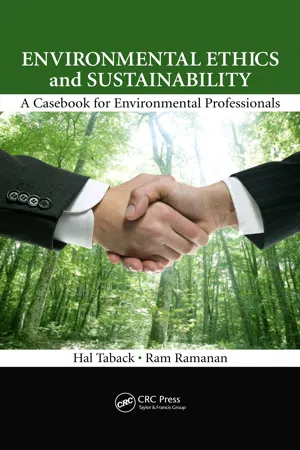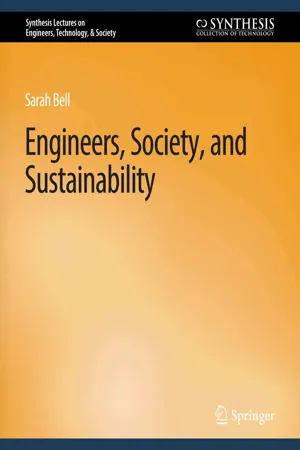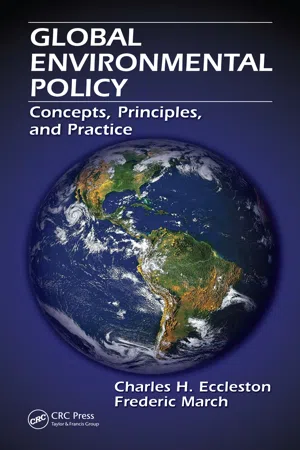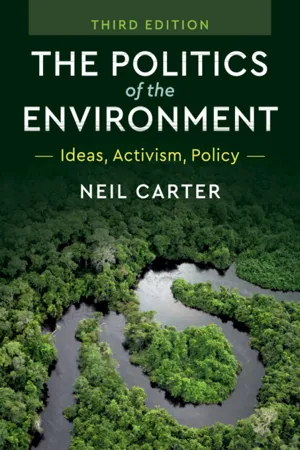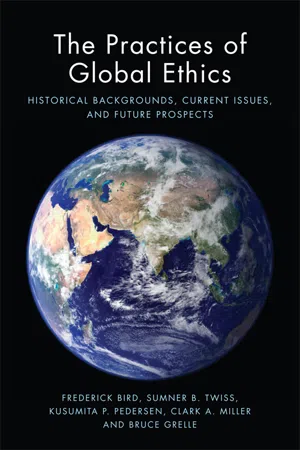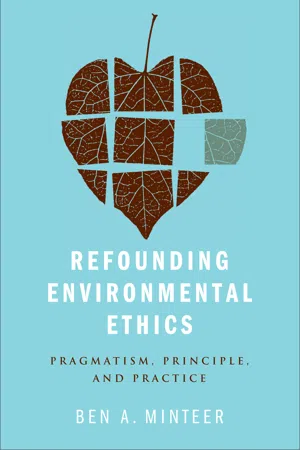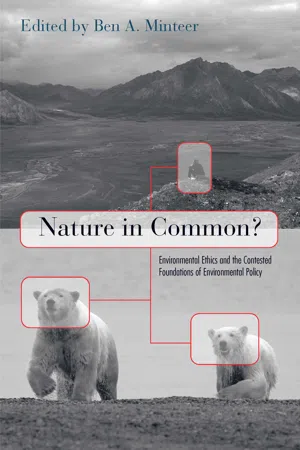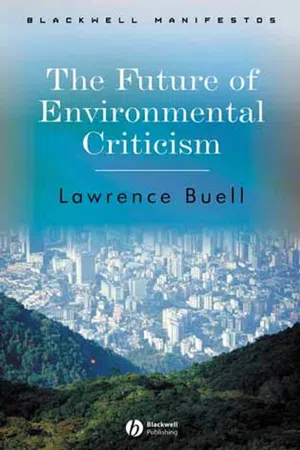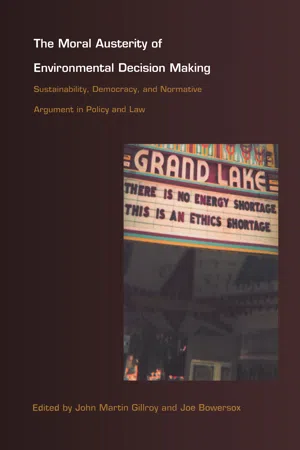Politics & International Relations
Environmental Ethics
Environmental ethics is a branch of philosophy that examines the moral relationship between humans and the environment. It explores questions about the value and rights of non-human entities, the responsibilities of humans towards nature, and the ethical implications of environmental policies and practices. Environmental ethics seeks to promote sustainable and responsible interactions with the natural world.
Written by Perlego with AI-assistance
Related key terms
1 of 5
12 Key excerpts on "Environmental Ethics"
- eBook - PDF
Moral Geographies
Ethics in a World of Difference
- David M. Smith(Author)
- 2000(Publication Date)
- Edinburgh University Press(Publisher)
Nor is there unanimity as to the way the field is defined, at anything other than a general level. For example, Environmental Ethics, or environmental philosophy, is described by Booth (1997: 256) as ‘an 179 NATURE: Environmental Ethics exploration of the cosmos and humanity’s relationship to it . . . the marriage of ecology and philosophy’. Others are more specific: Proctor (1998d: 236) cites the following definitions of Environmental Ethics in two anthologies: ‘the field of inquiry that addresses the ethical responsibilities of human beings for the natural environment’, concerning itself with ‘humanity’s relationship to the environment, its understanding of and responsibility to nature, and its obligations to leave some of nature’s resources to posterity’. Light (1996: 275) defines environmental philosophy as ‘the attempt to bring the traditions, history, and skills of philosophy to bear on the question of how to maintain the long-term sustainability of life on this planet’. The references to posterity and sustainability signal the primary concern with human survival. The term ‘global ethics’ is sometimes deployed to invoke the interdependent world of environmental problems. Unlike development ethics, Environmental Ethics has generated a substantial literature of a primarily philosophical orientation. A further definition is coupled with a summary of the problems encountered, as follows: Environmental philosophy engages in critical reflection on the moral rules, conventions, and shared meanings that inform human inquiry and our relationships to nature. As a relatively new branch of moral philosophy, Environmental Ethics arises out of increasing unease with the destructive consequences of human economic, technological, and cultural practices. Many philosophers are unpersuaded that reliance on traditional utilitarian and rights-based deontological moral theories can adequately respond to the problems, both philosophical and practical, that need to be addressed. - eBook - PDF
Environmental Political Thought
Interests, Values and Inclusion
- Robert Garner(Author)
- 2018(Publication Date)
- Bloomsbury Academic(Publisher)
1 1 INTRODUCTION: THE IDEA OF ENVIRONMENTAL POLITICS This book is about the political ideas current in thinking about the environment. It operates with a broad definition of ‘ideas’, including nor-mative and empirical dimensions, and a broad definition of the ‘political’, focusing not only on the state, but also civil society and the individual. Above all, the aim is to explain how a ‘politics’ of the environment can be distinguished from the coverage of other disciplines and, in particular, from environmental science. To do this, it is necessary to explore, in this introductory chapter, the idea of politics itself. What distinguishes a politics of the environment is the recognition that there are a variety of competing interests and values that need to be identified and explored. Environmental degradation does not affect all currently living humans in the same way. Moreover, the extent to which the goals of the Green movement are embraced depends upon the values adopted and, more specifically, what is regarded as an appropriate ethical position about the relationship between the human and non- human realms. A central component of environmental political thinking is a debate about how far moral entitlements end with currently living humans. Many political thinkers, and not just those with a commitment to environmentalism, hold that we have at least some moral obligations to future generations. Radical Green thinkers want to go even further by suggesting that these obligations extend beyond the human to non- human animals and even non-sentient parts of nature. As a result, future generations and non-humans ought to be included as beneficiaries of decisions currently living humans make, and perhaps also included, too, as members of the polity or political community. The three themes – interests, values and inclusion – therefore form the unifying thread to the chapters in this book. - eBook - PDF
Environmental Ethics and Sustainability
A Casebook for Environmental Professionals
- Hal Taback, Ram Ramanan(Authors)
- 2013(Publication Date)
- CRC Press(Publisher)
37 © 2008 Taylor & Francis Group, LLC 2 Environmental Ethics and Public Policy 2.1 Human Beings and the Environment As a society progresses it often faces a conflict between economic benefits and environmental degradation. Many environmentalists oppose drilling for oil and cracking shale to produce natural gas because of the potential impact on local natural resources. On the other hand, banning DDT, a chemi-cal known to be hazardous to human health, is now believed to have allowed malaria to rage in developing countries. Environmental Ethics means doing the right thing. But what is the right thing? Should society allow the develop-ment of a large manufacturing plant in a wild area near a small town where it could employ thousands of workers but would deprive wildlife of a place to exist and thrive? This industrial use of the land would also deprive hearty hikers, campers, and hunters of a place to participate in their activities. Isn’t this an ethical dilemma? The solutions to this dilemma range from denying a company the right to build the plant to dividing the wilderness area and providing a special cordoned-off section in the wilderness sector to encourage more outdoor participation. The wilderness area could be furnished with campgrounds and comfort facilities to give hikers a place to gather and stay overnight after their wilderness adventures. How about the wildlife in the pro-posed factory site? Even if the rabbits, squirrels, coyotes, foxes, etc., are captured and relocated, there is still the plant life and millions of small critters to consider. Environmental agencies have various criteria for dealing with these mat-ters but seldom take into account the specific details of a particular locale. They may provide a forum to allow the opponents and proponents to offer opinions, debate, and arrive at a negotiated compromise. They can define elements such as an endangered species list to be evaluated in the devel-opment approval process. - eBook - PDF
- Sarah Bell(Author)
- 2022(Publication Date)
- Springer(Publisher)
35 C H A P T E R 3 Environmental Ethics From the earliest years of the environmental movement, scholars and activists have tried to un- derstand why and how humanity is capable of ecological destruction on such a vast scale. Radical ecologists have not been satisfied with the ecological modernists’ pragmatic account and have looked for deeper cultural origins for the ecological crisis. Several distinct movements have developed within environmental philosophy and activism, each with a particular analysis and position on the underly- ing reasons for humanity’s destruction of nature and propositions for alternative social and political structures. Knowledge of the different elements within environmental philosophy is useful in itself, for their analysis and propositions, and also in order to understand the complexity of the environ- mental movement and environmental politics. Donna Riley (2008) in her volume Engineering and Social Justice identifies ecological justice as an issue that is central to engineering practice and efforts within the profession to make a positive contribution to social justice and equity. Ecological modernisation is a pragmatic, but also highly optimistic response to the ecological crisis. Whilst some advances have been made in reducing pollution and improving resource man- agement in particular countries, the environment has continued to be degraded at an alarming rate since the environmental crisis emerged in the 1960s. The processes of industrialisation proceed with such force that ambitions for radical resource efficiency, restorative environmental technologies and industrial ecology remain largely unfulfilled decades after they were first proposed. - eBook - PDF
Global Environmental Policy
Concepts, Principles, and Practice
- Charles H. Eccleston, Frederic March(Authors)
- 2010(Publication Date)
- CRC Press(Publisher)
Although political corruption is a significant factor that aids environ-mental degradation, especially in developing countries, (as mentioned in the Case Study section) there are ample opportunities for ethical environ-mental professionals to make a difference. To begin with, we can choose to apply our expertise in settings that enable outcomes that improve people’s lives and their environment. We can use our expertise to influence higher management in ways that serve the stated purposes of the institution or corporation. To do this, we need to refrain from assuming that all bad policies and decisions stem from unethical intent. Even when we have evidence of such intent, few are prepared to become “whistle-blowers,” although some will choose that path. Chapter eight: Environmental Ethics 227 Environmental Ethics cannot be boiled down to a simple 10 com-mandments. Real-world ethics are often fuzzy and mutually contradic-tory. The most important lessons are experiential. Unless we become hermits, we live in a world of families, personal friends, communities, workplaces, corporations, and governments. There are both good and bad ethical behavior models in all of them. Our task is to become fully aware as well as fully engaged. The single most important tool of Environmental Ethics is awareness of how every action in the environment has a reaction that is constructive, destructive, or neutral to an ecosystem at some scale. Ecology is the science of how species interact with each other in myriad ways. This knowledge is essential in formulating policies that ensure the health of ecosystems at all scales. Ecologist Manuel C. Molles writes as follows 27 : Our species is rapidly changing earth’s environment, yet we do not fully understand the consequences… human activity has increased the quantity of nitro-gen cycling…, changed land cover… and increased the atmospheric concentration of CO 2 . - eBook - PDF
The Politics of the Environment
Ideas, Activism, Policy
- Neil Carter(Author)
- 2018(Publication Date)
- Cambridge University Press(Publisher)
Are draconian controls on population growth justified if we are to reduce the pressure on the natural environment? Is it wrong to eat meat? Should we stop taking 13 flights in an effort to mitigate climate change? Environmental Ethics, by examining questions about how humans ought to think about and act towards nature, provides a link between theory and practice. It is primarily concerned with values. Does nature have value separate from its role in meeting human needs? If so, why? Which parts of nature possess value and are some parts more valuable than others? There is a strong normative element to environmental philosophy. Many leading contributors are also committed activists whose main objective is to develop a robust environmental ethical theory to underpin green activism. Radical perspectives such as deep ecology question the existence of a clear divide between humans and nature and may even push humans off their pedestal at the top of the ethical hierarchy. If ecologism is a separate ideology, then the way the human–nature relationship is concep- tualised arguably provides its most distinctive and radical feature. This chapter provides an introduction to the key debates in environmental philosophy. It considers whether an environmental ethic that attributes value and moral significance to nature is defensible, and whether it is a necessary component of a green political theory. The opening sections stake out the territory covered by environ- mental philosophy by distinguishing three differ- ent types of value, explaining the anthropocentric– ecocentric dichotomy and setting out a simple typ- ology categorising the main approaches within environmental philosophy. The main part of the chapter consists of a critical analysis of environ- mental theories of value under the two broad cat- egories of holism and moral extensionism. The final section suggests that the search for a pure non- anthropocentric perspective may be fruitless. - eBook - PDF
- Celia Deane-Drummond(Author)
- 2008(Publication Date)
- Wiley-Blackwell(Publisher)
29 Environmental Ethics Chapter 2 Environmental Ethics Debates about how to treat the natural world need to be set in the context of present environmental problems. Current scientific thinking on the most likely environmental pressures in the twenty-first century include climate change, avail-ability of water resources and water pollution, along with deforestation, desertification and environmental damage caused by poor national and international manage-ment. 1 These problems are not new, but are likely to get worse because of the lack of attention by policy-makers in many countries. However, in addition to these issues, the United Nations Environment Programme’s Global Environment Outlook 2000 suggests that new environmental problems will emerge. These come about first as a result of unforeseen events, or second because existing problems take a new unexpected turn, or third when areas that are currently neglected suddenly become significant. 2 Similar findings were reported in the Global Environmental Outlook 3 report in preparation for the Summit on Sustainable Development in Johannesburg in 2002. 3 Such results suggest a measure of contingency and un-predictability in environmental problems, and are clear signals that any sense of complacency is premature. Moreover, the lack of complete scientific knowledge, as well as its enormous complexity, gives us reason to be careful of any trite solutions from philosophical or theological ivory towers. While environmental scientists have become more aware of the mutual inter-dependence of the human and non-human, expressed as the relationship between socio-economic and environmental systems, the natural world remains an ‘other’ to be objectified and analysed according to the methods of science. - eBook - PDF
The Practices of Global Ethics
Historical Backgrounds, Current Issues, and Future Prospects
- Frederick Bird, Sumner B Twiss, Kusumita Pedersen(Authors)
- 2016(Publication Date)
- Edinburgh University Press(Publisher)
42 Collectively, this work has transformed the practice of global ethics into a daily business for tens of thou-sands of individuals around the world working in foreign ministries, state agencies, international organizations, NGOs, research facilities, industry lobby groups, international law offices, and many, many more. This activity is replete with ethical significance. Taken as a whole, even considering only the major environmental treaties, these activi-ties represent a massive effort to identify, articulate, deliberate, and codify an enormous array of global ethical principles and to interpret and apply their meanings to specific cases and decisions, reconciling and balancing their relative significance where appropriate. While it would be a gross overstatement to suggest that ethics, alone, formed the basis of global environmental governance, we can say two things. First, normative commitments are pervasive in global environmental governance, not least in the arguments made by participants in these forums in support of or against any given proposition. Second, and just as significant, the upshot of these negotiations determines just which ethical standards the world is willing to put into practice on a global basis. This work can be differentiated into a range of distinct domains of ethical work that have evolved broadly across global environmental governance. In doing so, we will use the UN Framework Convention on Climate Change as an illustrative case, but the domains have clearly evolved similarly across many if not all of the major envi-ronmental arenas. These domains include what might be termed the objectives and principles of global Environmental Ethics, standards of practice, regimes of accountability, and norms of participation. Others may want to expand this list. We use it only to exemplify the general idea of global ethical practice. Perhaps the most important domain of global ethical work has focused on normative standards for humanity . - eBook - PDF
Refounding Environmental Ethics
Pragmatism, Principle, and Practice
- Ben Minteer(Author)
- 2012(Publication Date)
- Temple University Press(Publisher)
2 Democracy and Environmental Ethics A Justification Introduction: The Price of Purity In Chapter 1, I describe the rise and development of academic Environmental Ethics in the 1970s and 1980s as a quest for a radically new environmental worldview and value framework that would be unequivocally nonanthropo-centric, recognizing the intrinsic value of natural entities and processes and establishing direct duties to promote the good or interests of nature. The emergence of a pragmatist counterpoint to this nonanthropocentric project in the 1990s was driven by a deep dissatisfaction among some philosophers with the ethical and methodological bent of this form of theory in environ-mental ethics. These dissenting writers argued that the nonanthropocentric position, at least as some of the field’s leading thinkers advocated it, was too dismissive of human values and motivations for conservation efforts and policy argument and too removed from the real-world pragmatics of envi-ronmental decision making to be of much use to environmental managers and policy makers. This critique, and the constructive call for a more human-istic, pluralistic, and practical philosophical project (under the banner of “environmental pragmatism”), characterizes the first wave of pragmatist writ-ing in Environmental Ethics (Light and Katz 1996). The pragmatist assessment of mainstream (i.e., nonanthropocentric) Environmental Ethics resonated strongly with me when I began studying in environmental philosophy in the mid-1990s. As I continued my work in the field over the next decade, I, too, would become increasingly concerned about the flight from the humanistic values of culture and experience by many nonanthropocentric philosophers, a move that I viewed then—and still see— as undercutting rather than supporting sound environmental policy goals. It - eBook - PDF
Nature in Common?
Environmental Ethics and the Contested Foundations of Environmental Policy
- Ben Minteer(Author)
- 2009(Publication Date)
- Temple University Press(Publisher)
Introduction: A New Ethics for Environmental Protection E nvironmental ethics emerged from the thickets of applied philosophy in the early 1970s as a rebuke to anthropocentrism, the human-centered outlook embedded within the Western ethical system. The anthropocen-tric worldview was singled out by the first generation of environmental philos-ophers for its failure to extend the boundaries of moral considerability— and the attribution of intrinsic value—to nonhumans (including animals and plants) and to larger ecological communities. These new non anthropocentric philosophers argued that the mainstream ethical traditions of the West—for example, Kantian ethics, utilitarianism, virtue ethics, and so forth—were not only insufficient as foundations for a new environmental ethic but also philo-sophically hostile to developing a more respectful relationship to nature. The conventional ethical theories, they argued, only considered human interests and harms worth recognizing. Nature itself was accorded only instrumental value; it was not deemed worthy of direct moral concern. One of the earliest expressions of the desire to launch a new nonanthro-pocentric ethics of the environment appeared in a 1973 essay published by New Zealand philosopher Richard Routley, “Is There a Need for a New, an Environmental Ethic?” 1 There, Routley (who later changed his name to Sylvan) introduced what has since been referred to as the “last man” scenario, which he proposed as a kind of moral litmus test to separate the anthropocentrists 1 BEN A. MINTEER Unity among Environmentalists? Debating the Values-Policy Link in Environmental Ethics 4 Chapter 1 from the nonanthropocentrists. According to the traditional ethical frame-works of the West, Routley argued, the last man surviving the collapse of the world system would be committing no wrong if he set about destroying every species of animal and plant on Earth. - eBook - PDF
The Future of Environmental Criticism
Environmental Crisis and Literary Imagination
- Lawrence Buell(Author)
- 2009(Publication Date)
- Wiley-Blackwell(Publisher)
4 The Ethics and Politics of Environmental Criticism Criticism worthy of the name arises from commitments deeper than professionalism. Environmental criticism, even when constrained by academic protocols, is usually energized by environmental concern. Often it is openly polemical. This is entirely understandable in the case of an issue widely recognized as grave, yet not so widely believed to require immediate action. “One must write with a red hot iron to make any impression,” as Ralph Waldo Emerson declared about what he knew his readers would agree was the greatest public evil in his nation’s history – slavery – but that only a few were as yet prepared to do anything about. 1 Often too, as for Emerson, the animus is directed inwardly as well as outwardly. As with abolitionist rhetoric, the polemical edge of contemporary environmental criti-cism reflects stress and disputation within the movement as well as resistance from opposing interests. From a distance, one sees a trend-line of mounting resolve during the late twentieth century to fathom and raise public consciousness about the history, present state, and possible future of the environ-mental interdependencies between human and nonhuman and within human society, made increasingly unstable and dangerous by drastic alterations in planetary environment. But this generalization is neither broad enough to encompass the sizeable minority of com-mentators who deny there’s an environmental problem, 2 nor cali-brated enough to indicate the disputes among those who do. Two related though non-identical forms of polarization that stand out are ecocentric or biocentric 3 vs. anthropocentric ethics (each of varying stripes, with many intermediate positions along the con-tinuum) and health of physical environment as first focus of concern vs. social welfare or interhuman equity as first focus of concern. - eBook - PDF
The Moral Austerity of Environmental Decision Making
Sustainability, Democracy, and Normative Argument in Policy and Law
- John Martin Gillroy, Joe Bowersox, John Martin Gillroy, Joe Bowersox(Authors)
- 2002(Publication Date)
- Duke University Press Books(Publisher)
Furthermore, I recognize that the required steps from moral and political theory to environmental law, and from public policy to administrative decision making and implementation are large ones. Nonetheless I am persuaded that matters pertaining to social justice (and moral and political values in general) must not be put aside, pace Buck, Rawls, and the prevailing opinion today among environmentalists and the public as a whole, when it comes to thinking about the environmental crisis and implementing remedial policies. To be sure, in our value-skeptical—some would say nihilist—modern cul-ture, any explicit normative position is likely to be criticized merely for being deontological, or, as I understand the meaning of this term, relying on basic but contentious conceptions of and principles about values and obligations such as social justice. This essay is addressed to such value-skeptical critics who wish to exclude moral considerations from environmental policymaking and imple- Considerations of Social Justice 39 mentation; those analysts who maintain that environmental theory, policy, im-plementation, law, and enforcement practices, can, and should, all be created and executed while intentionally excluding social justice. I say ‘‘intentionally’’ here because I do not believe that social justice can actually be excluded in reality from the wide-ranging scope and important nature of the environmental prob-lems confronting humanity at the beginning of the twenty-first century, as they involve issues of life and death, and the quality of life, of billions of people. So many individual lives, so many species, and so many ecological consequences are in the balance as a result of existing global and national injustice that we must not, I argue, deny the importance of social justice to environmentalism.
Index pages curate the most relevant extracts from our library of academic textbooks. They’ve been created using an in-house natural language model (NLM), each adding context and meaning to key research topics.


